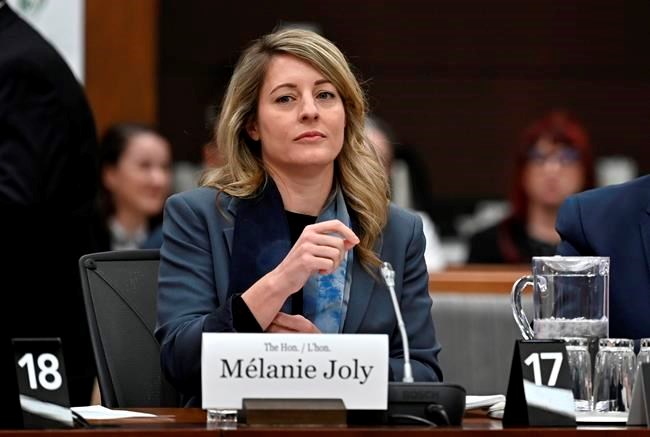OTTAWA — Canada is banning the import of Russian steel and aluminum as part of its sanctions regime, as Foreign Affairs Minister Mélanie Joly raises the possibility of regime change in Moscow.
Joly made the remarks at a Friday press conference where she discussed the importance of maintaining a diplomatic presence in Moscow.
"We're able to see how much we're isolating the Russian regime right now — because we need to do so economically, politically and diplomatically — and what are the impacts also on society, and how much we're seeing potential regime change in Russia," she said.
The Liberals have pushed for regime change in Iran, but Joly has not previously said the same about Russia. She said regime change is indeed the point of sanctions and pursuing accountability for alleged war crimes.
"The goal is definitely to do that, is to weaken Russia's ability to launch very difficult attacks against Ukraine. We want also to make sure that Putin and his enablers are held to account," she said.
"I always make a difference between the regime and the people of a given country, which is fundamental."
Russian Ambassador to Canada Oleg Stepanov called Joly's comments a "Freudian slip of the tongue."
"What she or other decision-makers in Ottawa don’t want to recognize is that the current Russian policy is supported by the ultimate majority of the nation," he said in a statement.
Also Friday, Finance Minister Chrystia Freeland announced a ban on imports of steel and aluminum, which she said will help undermine Moscow's ongoing invasion of Ukraine.
Figures from the Department of Industry show that Canada imported $208 million in steel products from Russia in 2021 and $79 million last year.
Canada also imported $44 million in aluminum from Russia in 2021 and another $16 million last year.
Russia's trade with Canada plummeted over the first 10 months after Moscow's invasion of Ukraine a year ago, with a 78 per cent per cent drop in exports from the same period one year prior.
Ottawa's economic measures already bar the export of everything from forklifts to barbers' chairs, unless Canadian businesses convince the Liberal cabinet to issue exemptions.
While the latest move sends a strong message that Canada is not done imposing sanctions on Russia, the commercial impacts of the steel and aluminum ban "will be quite muted," according to William Pellerin, a lawyer with McMillan LLP specializing in international trade.
"Anything coming from Russia has already been subject to a 35 per cent tariff," he said, estimating the latest move will likely curtail less than $2 million of additional trade.
"A lot of the imports from Russia plummeted over the course of the last year, so now banning these products in practice is not going to have that big of an impact."
Pellerin said the Canadian government could take more concrete action by enforcing previously issued sanctions against entities linked to Russia, which would "make examples of companies that have not been careful or have not properly taken steps to ensure that their trade compliance standards are up to par."
Ukrainian Canadian Congress (UCC) president Alexandra Chyczij welcomed Canada's latest sanctions, calling it inexplicable for western companies to continue doing business with Russia.
Chyczij said the group would continue calling for a full trade embargo against Russia by Canada and its allies, along with the designation of Russia as a state supporter of terrorism, the expulsion of all Russian diplomats from Canada, and more effective enforcement of sanctions that have already been imposed.
"Russia — a genocidal, terrorist state — must be treated as a pariah and isolated entirely from the international community," she said in a statement.
But Stepanov downplayed the move, saying Canada "had never been a significant market" for aluminum and steel.
"Considering (Prime Minister) Trudeau’s anti-Russian policy, it is actually good decision — Russia’s business community will not be tempted to supply a country who’s government dubbed Moscow an enemy," the ambassador stated.
Canadian Manufacturers and Exporters, an industry association that represents 2,500 companies across Canada, noted Russia is the 21st largest importer of steel into Canada and the 22nd largest importer of aluminum.
"Although the Russian imports are not a very significant portion, the ban by Ottawa does add pressure on the supply chain," said association president and CEO Dennis Darby in an email.
"While we certainly understand why the federal government is going forward with these sanctions, this once again shows how international geopolitics directly affect Canadian manufacturers and demonstrates why the federal government must support the manufacturing sector with concrete measures in the upcoming budget."
This report by The Canadian Press was first published March 10, 2023.
Dylan Robertson and Sammy Hudes, The Canadian Press



